- Home
- Wayne Thomas Batson
Isle of Swords Page 2
Isle of Swords Read online
Page 2
Another knock—this one more a tap—at the cabin door. The door opened, and there stood a dumpy man with a walrus of a moustache and with just a stump at the elbow to serve as one of his arms. In his one hand, he held a wooden spoon. He stood there waiting.
“Come in, Nubby. What can I do for you?”
“Well, Cap’n, you could get me to port so’s I can get some fresh meat! No fish is hitting the nets. We’ve got nothin’ left but hardtack and some moldy vegetables!”
Ross stared down at his sea chart. “What happened to those dog-sized rats you’ve been serving?”
“Cap’n, we ate ’em all. All’s left is them little boney ones, and the men’ll complain if I have to start serving those!” Nubby replied.
“The men will eat what they are served and be glad to get it,”
Ross stated without looking up from the chart. “And Nubs, cut the rations.”
“This’ll make the third time, Cap’n.”
“Do you see a choice, Nubs?” Ross asked, looking straight at the cook.
“Nay, Cap’n.” Nubs frowned dejectedly and beat a hasty retreat.
Declan Ross leaned back in his chair and exhaled loudly. He shook his head. Let’s see . . . the Wallace is about to fall apart in shark-infested waters, the only place close enough where we can ground the ship and make repairs is in the territory of the most ruthless man alive, and, oh yes, we’re just about out of food. At least it can’t get any worse than— SLAM!! Ross’s cabin door flew open and in stomped a lass with flaming red hair barely concealed beneath a black bandanna. At her side was a silver cutlass. “FATHER!! You have got to let me sign!!”
“We’ve been through this before, Anne,” he replied, rubbing his temples. So much for it not getting any worse.
“Well, I don’t care what the crew thinks about having a woman aboard! I’m here, aren’t I? I’ve brought no bad luck, have I?”
Ross started to say something about the lack of wind and their diet of rats, but bit his tongue. “What’s this about, Anne?”
“It’s Henrik and Jules—they follow me around everywhere just so they can give me something to do!”
“Henrik? Jules?”
“This time!” Anne shouted, one hand on the hilt of her sword, the other waving a finger in the air. “Yesterday, it was Red Eye.
Cromwell the day before. Just about every one of the crew—they treat me like some kind of peasant! Even Stede made me go fix him a bowl of lobscouse! You need to let me go on the register—sign the articles!”
“No, Anne,” he replied, trying to hold his temper in check. “I promised your mother—”
“But she’s not here!”
“Anne, that’s enough.”
“But I can sail!” she pleaded. Her hazel eyes seemed to turn deep blue as tears flooded in. “I can navigate. I can do all the rigging. I’m better with the sword than almost any—”
“I said NO!!” He slammed his fist on the desk, sending his mug skidding off the side where it crashed on the floor.
Anne’s lower lip trembled. She turned abruptly and marched out of her father’s cabin. But just before she slammed the door, he heard her mutter, “I’d be a better pirate than you are.”
Captain Declan Ross stared at the door. “That’s what I’m afraid of, Anne. That’s what I’m afraid of.”
4
CAREENING
At last!” Ross exclaimed, a smile spreading across his face. He slapped Stede’s shoulder and strode across the main deck to the forecastle.
Ross stood proudly on the deck and looked out over the bow. He put his hands on his hips and muttered, “I’m glad we made it. The wind up and quit on us.”
“Aw, I’ve seen us through warse!” Stede called after him.
“Made it?” barked a broom-shaped man who clambered up beside his captain and squinted. “I don’t see nothin’.”
“Your lights gone dead, have they, Midge?” Ross leaned in close and pointed out over the sea. “Land, you half-blind laggard! The cays. We’ll be kissing the sand in an hour. Don’t you see?”
Mr. Midgely stared, a dark scowl forming on his stubbly face.
Slowly, a wide grin appeared, revealing a set of yellow teeth, most rotten, leaning or poking out of his gums at odd angles. “I see ’em! I see ’em, Cap’n!” Midge exclaimed, breathing each word into Ross’s face. “Little-bitty things, they is, but I see ’em!”
“Your breath, man!” Ross exclaimed, ducking quickly away from the carpenter and his rotten teeth. “Worse than usual—oh, that’s horrible. What’ve you been eating?”
“Rats,” he replied proudly. “I found a couple of ’em ol’ Nubby missed. They were smashed under a barrel, and I—”
“I don’t think I want to hear any more,” Ross said, moving quickly down the forecastle stairs. It was a vain effort to get the foul reek out of his nose. Ross feared that Midge would one day catch his death from something he ate—which was a shame because the man knew how to fix a ship. “Get your team down to the hold and get whatever lumber you can salvage. And, Mister Midgely . . .”
“Cap’n?”
“At least cook the rats next time.”
Ross turned to his quartermaster, who stood at the wheel. “Stede, bring us in slowly!”
“We don’t have much choice about that, eh!” Stede called back.
Ross looked up at the sails billowing ever so slightly. It was a wonder they’d made it to the cays at all with such a mild breeze. He shook his head and ran a hand lovingly along the rail of his ship. The William Wallace had done them all proud over the years. He’d bought the hundred-year-old brigantine from Ramiro de Ferro Goncalo, an old shipwright in Portugal, for fifty pounds of gold ingots and a cask of salted pork. It was a good deal—for Ramiro anyway. Most pirates would have taken the ship by force, but that’s where Ross drew the line. You could take a man’s gold. You could take a man’s silver. You could even take some of a man’s food. But you never took a man’s ship.
Next to his daughter, Anne, and his close friend, Stede, his ship was the best thing in his life. The Wallace was well armed, fast, and maneuverable. But the Wallace was also old. As the ship turned slightly and began his drift run to shore, Ross wondered just how long he could keep the Wallace afloat.
“Tie-down!” Ross yelled. Quickly, everyone but Stede and Captain Ross grabbed hold of a rail or a strand of rigging and sat low on the deck. They all braced for the impact of the ship’s bow as it plowed into the sandy bottom, waiting to see which new sailor would be cart-wheeled overboard during the jolt. But it didn’t come. Instead, they felt just a few light bounces, and the William Wallace came to rest.
“That’s all?” asked Cromwell, the ship’s bosun.
Anne laughed. “No wonder, with such little wind.”
“Great,” Ross muttered. He looked over the bow and saw they were parked still thirty yards from the shore.
“Guess we’ll just have to wait until low tide to start unloading,” said Cromwell, who never saw a job that couldn’t wait.
Stede’s gigantic hands clamped down on Cromwell’s shoulders from behind. Lifting Cromwell off the deck, he asked, “Permission to throw this outrageous mon overboard, Cap’n?”
“What?” Cromwell’s arms and legs flailed helplessly. “Stede, put me down. What’d I do? Put me down.”
Ross glared at his bosun being held by Stede a foot off the deck.
“You have evidently forgotten that these little cays are Thorne’s isles. If you want to wait around for him or one of his friendly mates, be my guest. We will careen the Wallace and get out of here as fast as we can. And . . . we will unload this ship right NOW, beginning— I think—with the biggest hunk of dead weight aboard.”
“No, Cap’n,” Cromwell pleaded. “I just wasn’t thinking. You wouldn’t take—”
“Mister Stede?” said Ross.
“Aye, sir?”
“Permission granted.”
“Nooooo!” In one fluid motion, Stede hurle
d Cromwell up and over the bow’s rail. His arms and legs pinwheeling, he fell like a stone and landed in the turquoise water with a horrendous splash.
The captain turned to his crew. “Anyone else want to wait for low tide to unload?”
Two hours later, the William Wallace was nearly light enough—and the tide was nearly low enough—to begin turning the ship on his side to make repairs. Led by a remarkably tireless bosun Cromwell, the crew had secured the hatches and carried most of the stores to shore.
From Ross’s vantage point onshore, the cay appeared to be a large crescent. The white sand stretched more than a hundred yards from the surf to the lush copse of palms and other tropical vegetation. The tree line gradually curled toward the sea on the eastern part of the island. Excellent cover—a perfect place to careen a ship.
But that worried Ross. He couldn’t imagine as clever a pirate as Thorne leaving a cay like this one unwatched for long. “Get a move on, lads!”
Midge was already at work, chiseling barnacles off the exposed sections of the hull. Nubby had discovered an ample supply of iguanas scurrying over the white sands and up the coarse palm trunks.
With visions of stew stirring in his head, he flung himself all over the beach after the big green lizards. The captain and Stede busied themselves securing and testing the lines they would use to pull the
Wallace on his side. Everyone seemed to be busy doing something important—everyone, that is, but Anne.
The captain’s daughter sat on the edge of a pile of driftwood and carved a piece of yellow coral with a very sharp dagger. She’d always enjoyed that, and she was quite good at it. Rings, bracelets, even figurines—but always decorated with something dangerous: snakes, thorny vines, or sharks. Anne was especially proud of this latest creation: a ferocious Bengal tiger with bared fangs and an outstretched paw. As good as the new carving was, Anne couldn’t bear to just sit there while everyone else had pirate things to do.
With an exasperated sigh, Anne stood, sheathed her dagger at her waist, and put the coral tiger in a pouch around her neck. She scanned the activity around the ship and watched how her father doted on his crew. Those scallywags meant more to him than his own flesh and blood. She kicked up a mound of white sand and turned her back.
Her eyes followed the tree line, the palms, the divi-divi trees, and the . . . wait a minute! Under the canopy of wide palm leaves, she noticed a familiar shadowy bunch, hanging down like a gray chandelier. Plantains!
Anne charged over to Captain Ross. “Father, I think those palms over there are plantains. Can I go look?”
“Plantains?” Ross glanced at Nubby, who was still busy chasing iguanas. “If you’re right, you might just save the lives of the whole crew. Go ahead, but . . .” He glanced into the shadows under the canopy of palms. “Take Jules with you.”
“I can take care of myself.”
“I know you can,” said Ross. “But if those are plantains, two of you can carry a lot more back than just one.” It was a weak excuse, Ross knew. He just hoped she’d buy it.
Anne frowned at her father. He never lets me go off alone!
The dark-skinned giant lightly lowered two barrels from his shoulders and lumbered over. Jules stood a foot taller than the captain. He went about shirtless. With broad, well-muscled shoulders and hands the size of cannonballs, Jules was a fearsome sight.
“Anne seems to have spotted some plantains in the palms over there,” Ross said. “Bring as many back as you can carry, and we may yet avoid having to eat Nubby’s iguana stew.”
“I like iguana stew.” But seeing the look on his captain’s face, Jules nodded and turned to Anne. “Let’s go.”
Jules took one step for every three of Anne’s. Neither the sand nor the incline slowed him down. Anne could barely keep up.
“Red!” he said, a voice like thunder.
Anne grumbled and stomped up the dune after him. “I’ve told you a thousand times, don’t call me Red!” She caught up to him and poked him in the arm with her finger. It hurt—Anne, not Jules.
“What should I call a wench with hair the color of flame?”
“I’m not a wench!” Anne poked him in the arm again. It hurt again—Anne, not Jules. “I certainly won’t be fetching you a mug of grog anymore.” She poked him one more time to make sure he got the point.
“Why do you keep doing that?” Jules asked. “It must hurt.”
His face was stern, and he made Anne feel like a great tree trunk was about to fall on her. But then his moustache quivered, and he broke into a broad grin. They laughed the rest of the way to the tree line.
“I was right,” Anne whispered. “Look at them.”
In the tops of the palms, nestled beneath wide, shady leaves, were huge barrel-shaped bunches of plantains. They looked like green bananas but tasted more like potatoes until sweetening a little and turning black at their ripest point. Anne snapped a plantain from a squat stalk. Her dagger was out in a flash, and she expertly carved away the green skin on all sides. She took a big bite of the white fruit.
“This ought to give us enough food until our next port,” said Anne.
Grinning mischievously she added, “Or our next ‘fat’ galleon.”
“I still want iguana stew,” Jules muttered.
“You can have your green lizard stew,” said Anne. “And my portion as well.” She drew her cutlass and waded into the forest, jumping, hacking, and chopping. Bunches of plantains fell, and Jules came behind her and hoisted them up on his shoulders.
“You are very handy with that sword, Red,” said Jules, taking great pains to stay out of her swing radius.
Anne glared at him and brandished the cutlass. “I told you not to call me that!”
“If you want to be a pirate, a pirate captain even, you need a fearful name.”
“And you think Red will scare anyone?”
Jules hoisted up another bunch of plantains. “I was thinking Anne the Red. Sounds like blood.”
“Sounds like some beheaded queen to me.” They laughed, but Anne stopped first, becoming thoughtful. Most of the crew knew of her desire to be a pirate, but only Jules knew that her real ambition was to captain a ship herself. Only then could she have the freedom she desired. Freedom to go where she wanted, whenever she wanted. Away from the mainland and the shackles that had fettered her mother and eventually caused her death. Away from the society that looked on her as good for little else than a serving wench or a chambermaid. Away from her father, who loved the sea and admired his crew, but smothered—or worse, ignored—these same traits in his daughter. But Jules was right. If she ever wanted to be a pirate, she needed a name.
Anne went at the plantains with renewed vigor, chopping at all she could reach and venturing deeper into the palms. Jules already carried more than any one man should be able to carry but made no complaint. Still, the weight of the mounds of fruit on his shoulders slowed him down, and Anne found herself well ahead of her chaperone . . . her protector. She winced. She looked over her shoulder.
He was pretty far back there.
Then Anne had a thought. It wasn’t the first time she’d had this thought, but it was the first time in recent memory she’d had the opportunity. All I’d have to do is turn a corner and disappear into the trees. By the time Jules realized, I’d be long gone. Anne thought for sure the island was large enough to hide her. The palms were dense enough, and there might be some caves.
But what would she do next?
Anne hadn’t really thought that far. She’d be stranded on one of a thousand cays in the Spanish Main. But . . . hadn’t Stede said something about these cays being in Thorne’s territory? Maybe, she thought, maybe I could cut my hair . . . stow away on one of Thorne’s ships and learn how to be the kind of pirate that people feared. She leaped and hacked down a huge cluster of plantains.
Or maybe, I’ll just get myself killed. She looked back at Jules. He was struggling a little, farther back than before. He wasn’t even looking at her. If t
here was ever going to be a time, it was now.
5
THE BUTCHER
Anne turned a corner around a fat palm and sprinted away. Ducking and swerving recklessly, she smacked through coarse underbrush, tangling vines, and leaves bigger than an elephant’s ear. She tripped over a small gnarly divi-divi tree, fell, and lay still.
“ANNE!!” Jules’s voice thundered in the forest behind her. Anne leaped to her feet, not knowing which way to run. She ducked under a bough and raced in a new direction. She drove herself on, feeling like her dream of freedom was slipping through her grasp. Two more frantic steps and she burst out of the palm forest and landed facedown in white sand.
She feared she had run in a circle and doubled back to the shore where they had run the ship aground. But as she stood and wheeled around, she realized that it was not so. The island was just larger than she had imagined, and she had raced from one side through the trees and on to another side of the island.
Anne brushed herself off and wondered what to do. There was something there, on the sand . . . near the water’s edge. She glanced back at the trees. Jules could be getting closer. He could appear at any moment. Still, she looked at the shape. Something was there, a dark smudge sprawled across the bright sand.
Squinting and blinking, she took a few cautious steps. As she neared, the shape became more distinct. It was a person. In spite of the relentless heat of the Caribbean sun, goose flesh rippled on her arms. At last she came upon a piteous, crumpled form. A man. A dead man.
Anne wondered where he had come from and what had happened to him. He was covered in blood: some red, bright, and wet; some caked and purplish; some dried in maroon splotches. His boots were scuffed and partially underwater. His breeches were torn and gouged. And his once-white shirt was a mess of bloody tatters.
When she saw the deep, scourging wounds on his back, Anne knew what had happened to this man. He had been whipped with a vicious cat-o’-nine-tails. A heavy baton whip with nine cords, each ending with a jagged piece of metal, glass, or wood—only such a weapon could do that kind of damage to a man. That was a penalty doled out only to the worst of criminals or mutineers, but seeing the damage the cat had done made Anne feel pangs of sorrow. She bent down and sadly stroked his matted mop of blond hair. What did you do, she wondered, to deserve thi— His head jerked up. Anne fell backward, her heart racing. She rose to one knee and watched with horror as the man lifted his head. His face was a swollen mass of bruised and cut flesh. A brief glint of blue eyes, pleading and desperate, gleamed out from the mass of hair. His whole body racked with long, wheezing coughs, and his head fell pitifully onto the sand.

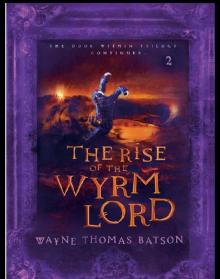 The Rise of the Wrym Lord
The Rise of the Wrym Lord Search for the Shadow Key
Search for the Shadow Key GHOST_4_Kindle_V2
GHOST_4_Kindle_V2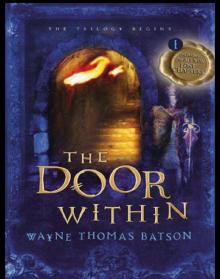 The Door Within
The Door Within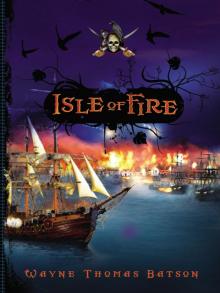 Isle of Fire
Isle of Fire The War for the Waking World
The War for the Waking World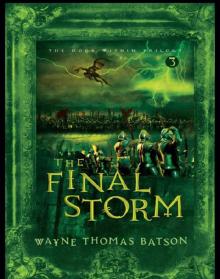 The Final Storm
The Final Storm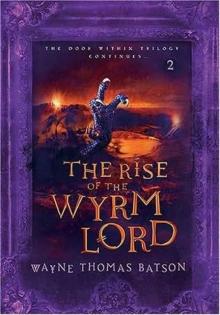 The Rise of the Wrym Lord tdw-2
The Rise of the Wrym Lord tdw-2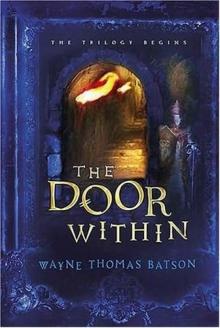 The Door Within tdw-1
The Door Within tdw-1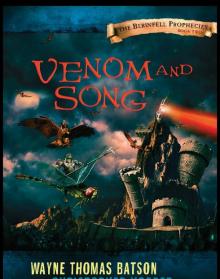 Venom and Song
Venom and Song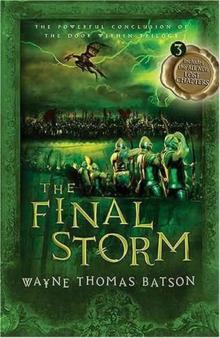 The Final Storm tdw-3
The Final Storm tdw-3